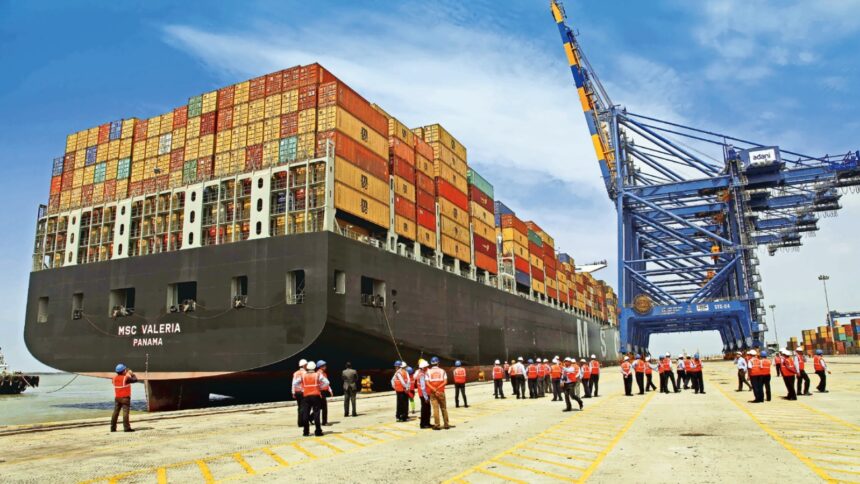The Centre has set the ball rolling to increase the fleet of large ‘Made in India’ merchant ships with an eye on joining the league of the top maritime countries of the world over the next two decades.
The move stems partly from a realisation that a large fleet of merchant ships made in India is required, since foreign ships that transport merchandise to and from India may choose to stay away in case of an emergency.
A situation like the recent three-day escalation between India and Pakistan can put ports on high alert, and may dissuade foreign ships from visiting Indian ports, thus harming trade. The government also feels that becoming a maritime power is an essential part of being a “developed nation” — something that the government hopes to become by 2027.
“We need our own ships to replace foreign ships, as the latter may stay away in an emergency situation, and that will harm our global trade. The policy of the government is to take strides in this direction over the next decade or two,” said a highly placed source in the Ministry of Ports, Shipping and Waterways. “Initiatives have been launched to boost indigenous shipbuilding and repair capabilities, reducing dependence on foreign vessels. India is advancing towards becoming the top 10 shipbuilding nations by 2030 and to ascend to the top five by 2047,” said an official.
Union Minister of Ports, Shipping and Waterways Sarbananda Sonowal told : “India has everything it requires to be a global shipbuilding powerhouse. Our strategic location, technological expertise, demographic and cost advantage, and robust steel industry are there.”
“Further, recent radical policy reforms ushered in by our government by way of Maritime Development Fund, Shipbuilding Financial Assistance Policy, Shipbuilding and Ship Repair Clusters, infrastructure status to large vessels, customs duty exemption to components used in ship building and ship repair, comprise a comprehensive package to kickstart a revolution to repost India’s shipbuilding industry on the pinnacle of global shipbuilding arena,” the Union minister said.
A ministry note explains the major policies that have been set in motion to achieve this ambitious target.
In the 2025, a Rs 25,000-crore fund has been set up under Maritime Development Fund to provide long-term, low-cost financing for shipbuilding, repair, and maritime infrastructure projects. The government will contribute 49 per cent of the fund, with the remainder to be mobilised from ports and the private sector.
This initiative is expected to generate investments of up to
Rs 1.5 lakh crore by 2030. With an outlay of Rs 18,090 crore, Shipbuilding Financial Assistance Policy (SBFAP) 2.0 offers direct financial subsidies to Indian shipyards to enhance their competitiveness in the global market.
“To promote sustainable practices, a 40 per cent credit note on the scrap value of old ships is to be provided under the Shipbreaking Credit Note Scheme for shipbreaking in Indian yards. This credit can be used towards the purchase of new ‘Made in India’ vessels. The customs duty exemption on inputs used for shipbuilding and ship-breaking has been extended for another 10 years, reducing production costs and encouraging domestic manufacturing,” according to the note.
‘Global centre for maritime finance’
SCI Bharat IFSC Ltd was incorporated on August 12, 2024, as a shipping company, with its registered office at GIFT House, GIFT City, , Gujarat, to undertake chartering, owning of vessels and other permitted shipping activities as per the ship leasing framework of the GIFT IFSC.
“The establishment of a new shipping company, in collaboration with state-run oil, gas, and fertiliser companies, aims to expand India’s fleet by at least 1,000 ships over the next decade. This initiative will reduce reliance on foreign shipping services and cut freight costs by at least 33 per cent by 2047,” says the ministry note.
“As of now, most of the big ships are foreign, and we may be having just 50-60 large ships, in a total fleet of about 1,500 merchant vessels. We need to take a quantum jump in building ‘Made in India’ ships, and the present policy is designed for that,” said an official.
India is already a leading global player in ship recycling. In 2024, India was the second-largest global ship recycling nation by tonnage. India’s share in the global ship recycling industry was around 33 per cent in 2023, accounting for one third of the total global tonnage dismantled. The Alang Ship Breaking Yard in Gujarat is a major hub for ship recycling in India, responsible for dismantling a significant portion of retired ships.
The next aim, thus, is to make India a leader in shipbuilding too – the idea being to strengthen the maritime triad of shipbuilding, repairing and recycling.
Vikas has taught as a full-time faculty member at Asian College of Journalism, Chennai; Symbiosis International University, Pune; Jio Institute, Navi Mumbai; and as a guest professor at Indian Institute of Mass Communication, New Delhi.
Vikas has authored a book, Contesting Nationalisms: Hinduism, Secularism and Untouchability in Colonial Punjab (Primus, 2018), which has been widely reviewed by top academic journals and leading newspapers.
He did his PhD, M Phil and MA from JNU, New Delhi, was Student of the Year (2005-06) at ACJ and gold medalist from University Rajasthan College in Jaipur in graduation. He has been invited to top academic institutions like JNU, St Stephen’s College, Delhi, and IIT Delhi as a guest speaker/panellist.








